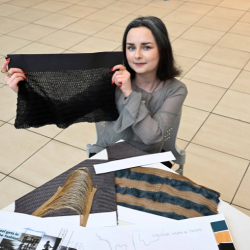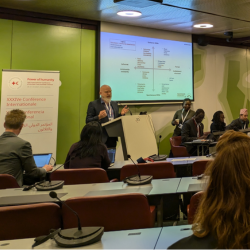-
Study
-
Quick Links
- Course Search
- Unlock Your Potential
- Still time to Apply
- Higher and Degree Apprenticeships
- Continuing Professional Development
- Book an Open Day
-
Undergraduate
- Course Search
- Application Guides
- UCAS Exhibitions
- Foundation Years
- Fees and Funding
- School & College Outreach
- Information for Parents
-
Postgraduate
- Course Search
- Application Guide
- Postgraduate Research Degrees
- Flexible Learning
- Fees and Funding
- Change Direction
- Register your Interest
-
Student Life
- Students' Union
- The Hub - Student Blog
- Accommodation
- Northumbria Sport
- Support for Students
-
Experience Northumbria
- Open Days & Events
- Virtual Tours
- Campus Tours
- Life in Newcastle
-
-
International
International
Northumbria’s global footprint touches every continent across the world, through our global partnerships across 17 institutions in 10 countries, to our 277,000 strong alumni community and 150 recruitment partners – we prepare our students for the challenges of tomorrow. Discover more about how to join Northumbria’s global family or our partnerships.
View our Global Footprint-
Quick Links
- Course Search
- Undergraduate Study
- Postgraduate Study
- Information for Parents
- London Campus
- Northumbria Pathway
- Sign up for Information
-
International Students
- Information for Students
- International Events
- Application Guide
- Entry Requirements and Education Country Agents
- Global Offices
- English Requirements
- English Language Centre
- International student support
-
International Fees and Funding
- International Undergraduate Fees
- International Undergraduate Funding
- International Masters Fees
- International Masters Funding
- International Postgraduate Research Fees
- International Postgraduate Research Funding
-
International Partners
- Agent and Representative Network
- Global Partnerships
- Global Community
-
International Mobility
- Information for Northumbria Students
- Information for Incoming Exchange Students
-
-
Business
Business
The world is changing faster than ever before. The future is there to be won by organisations who find ways to turn today's possibilities into tomorrows competitive edge. In a connected world, collaboration can be the key to success.
More on our Business Services -
Research
Research
Northumbria is a research-rich, business-focused, professional university with a global reputation for academic quality. We conduct ground-breaking research that is responsive to the science & technology, health & well being, economic and social and arts & cultural needs for the communities
Discover more about our Research -
About Us
-
About Northumbria
- Our Strategy
- Our Staff
- Place and Partnerships
- Leadership & Governance
- Academic Departments
- University Services
- History of Northumbria
- Contact us
- Online Shop
-
-
Alumni
Alumni
Northumbria University is renowned for the calibre of its business-ready graduates. Our alumni network has over 246,000 graduates based in 178 countries worldwide in a range of sectors, our alumni are making a real impact on the world.
Our Alumni - Work For Us
What will I learn on this module?
The purpose of this module is to enable you to understand and explore the purpose, design, production and dissemination of research. You will also have an opportunity to consider how research may be co-produced by members of the public and be used to promote marginalized groups and increase inclusive practice. To achieve this, you will learn about contrasting methodologies, methods, analysis and possible impacts of research. It is hoped that from this you will be supported to play an active and authentic role in future research projects and be able to be critical of existing ones.
How will I learn on this module?
You will learn through a lecture and enquiry-based approach using seminars, interactive learning and eLearning resources. You will be introduced to core research principles and practices through keynote lectures. You will then have the opportunity in seminars to explore key concepts and practical issues associated with research. For example, possible ethical dilemmas and conflicting safeguarding issues.
How will I be supported academically on this module?
Module lecturers and seminar leaders will support your development through lectures and seminar groups. Formative assessment tasks will aid preparation for the summative assignment and help identify your strengths and also aspects which require development. Contact details for all tutors for this module are available in the module handbook and via the eLP.
What will I be expected to read on this module?
All modules at Northumbria include a range of reading materials that students are expected to engage with. Online reading lists (provided after enrolment) give you access to your reading material for your modules. The Library works in partnership with your module tutors to ensure you have access to the material that you need.
What will I be expected to achieve?
Knowledge & Understanding:
1. You will be able to identify the difference between research and other ways of ‘finding out about’ or measuring experience and service delivery.
2. You will demonstrate an understanding of the dynamic and evolving nature of research and identify and recognize its complexity within the context of experience and service delivery.
Intellectual / Professional skills & abilities:
3. Know the differences between (a) research that uses numbers and statistics and (b) research based upon peoples descriptions and stories.
4. Know what stages are necessary in planning and carrying out a research project; and be able to think about new ways of making your developing knowledge count in order to have your voice heard and make a difference to how services are organised and delivered.
Personal Values Attributes
(Global / Cultural awareness, Ethics, Curiosity) (PVA):
5. You will know the features of ethical research in respect of others’ wishes, rights and interests.
How will I be assessed?
Formative assessment – portfolio:
The summative assessment for the module will be the submission of a portfolio of three separate pieces of work that link to a single research project of the students choosing. This module offers 20 credit points/level 4, a 40% pass mark. See details below:
1. Design a poster (or equivalent) attracting the public to sign up for a research project (creative piece). This needs to capture communication about a research project in plain English (necessary for a recruitment poster), it is an opportunity to do something visually engaging. This could include an alternative to a poster such as a TV advert, Facebook advert or campaign. (MLO: 1 and 2)
2. Explain the elements of good interview techniques through video or other means. This will demonstrate the students interview skills. The students interpersonal skills including the ability to respond and adapt to an interview topic guide/protocol. It also demonstrates an understanding of the function of the interview and how it informs the wider study design. The interview topic guide/protocol will also be submitted. (MLO: 3 and 4)
3. Written piece on what makes research ethical/safe (500 words) in relation to the students chosen project. This demonstrates essential knowledge and understanding of what PPI groups should be monitoring and reviewing throughout the course of a study. (MLO: 5)
Pre-requisite(s)
N/A
Co-requisite(s)
N/A
Module abstract
This module explores the reality and theory behind the increasing involvement of the public in the co-production of research. We value your lived experience in how to understand and develop better research. This includes understanding the conception, design, production and sharing of research to be used to promote marginalized groups and increase inclusive practice. We want you to have the knowledge and skills to play a more significant and meaningful role in research, which may lead you to future research opportunities and employment.
Course info
Credits 20
Level of Study Undergraduate
Mode of Study 5 months Part Time
Department Nursing, Midwifery & Health
Location Coach Lane Campus, Northumbria University
City Newcastle
All information is accurate at the time of sharing.
Full time Courses are primarily delivered via on-campus face to face learning but could include elements of online learning. Most courses run as planned and as promoted on our website and via our marketing materials, but if there are any substantial changes (as determined by the Competition and Markets Authority) to a course or there is the potential that course may be withdrawn, we will notify all affected applicants as soon as possible with advice and guidance regarding their options. It is also important to be aware that optional modules listed on course pages may be subject to change depending on uptake numbers each year.
Contact time is subject to increase or decrease in line with possible restrictions imposed by the government or the University in the interest of maintaining the health and safety and wellbeing of students, staff, and visitors if this is deemed necessary in future.
Useful Links
Find out about our distinctive approach at
www.northumbria.ac.uk/exp
Admissions Terms and Conditions
northumbria.ac.uk/terms
Fees and Funding
northumbria.ac.uk/fees
Admissions Policy
northumbria.ac.uk/adpolicy
Admissions Complaints Policy
northumbria.ac.uk/complaints












